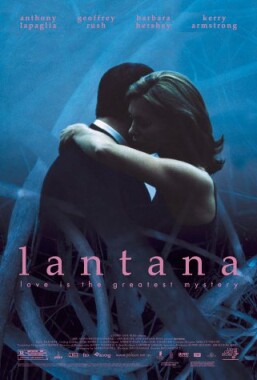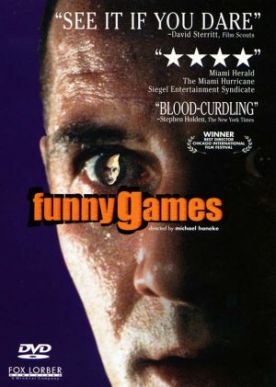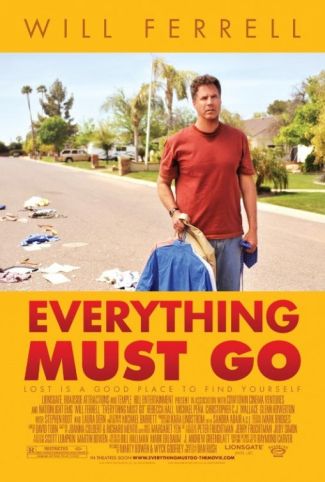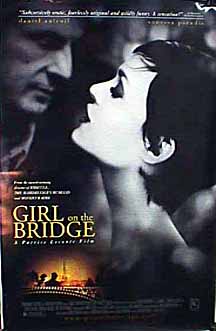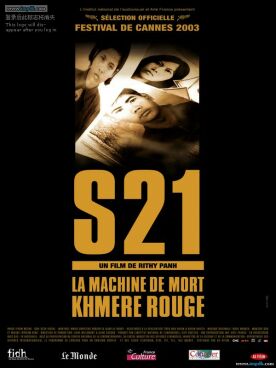Lantana
Lantana, directed by Ray Lawrence and written by Andrew Bovell
adapting his own play, Speaking in Tongues, seems at first glance to be
too much the chick-flick — a talking-about- relationships movie so full to
bursting with compassion that you can hardly stand it. But closer inspection
reveals an intricately plotted drama which has combined, rather bizarrely it
might seem, talking-about-relationships with one of the great cinematic
clichés of our time, the burnt-out cop. As is so often the case when the
clichés of the American cinema fall into Australian hands, the result is
something that manages to look quite new, its very strangeness allowing us to
see familiar problems with fresh eyes.
With the gruesome opening scene of a woman’s body being found among the
lantana bushes outside Sydney (lantana is an Aussie shrub with lush green
foliage on the outside and sharp thorns underneath it), we might expect
something more familiar. But from there we take up the story of one of the
investigating officers, the burnt-out case mentioned above, who is called Leon
(Anthony LaPaglia). He is married to Sonja (Kerry Armstrong) but is having an
affair with Jane (Rachael Blake), a separated woman whom he has met in the
salsa dancing classes he attends with his wife. We catch a glimpse of Leon and
Sonja in dance class. The Instructor tries to push the married couple together:
“Leon,” he says, “this is about sex; it’s about a man and a
woman joined groin to groin. Get it?” But Leon doesn’t get it,
apparently. He continues to dance morosely as if he’d rather be doing
anything else.
Yet he doesn’t love Jane and does love his wife. Later he explains to
the latter the reason for the affair as having to do with the fact that he
can’t feel anything. He is numb. It has, perhaps, something to do with his
job. Two or three times, however, we see him doubled up with chest pains, though
he insists that he doesn’t have a weak heart. Here is a man, we realize,
who refuses to acknowledge his own feelings in ways familiar from other
portraits of strong, silent, “macho” men, but in this film all the
other main characters are doing the same thing. It is a film about
“denial,” about secrets and lies — both the lies we tell
others and the lies we tell ourselves, and we cannot be aware of the gap between
the rhetoric and the reality of our emotional lives.
Sonja is attending regular therapy sessions with Dr Valerie Somers (Barbara
Hershey), to whom she confesses that she suspects her husband of having an
affair. She says it’s not the affair she minds but the deception. She
doesn’t know it is Jane that her husband is sleeping with. Next door to
Jane lives her best friend, Paula (Daniella Farinacci) and her husband Nik
(Vince Colosimo) who have two small children. Nik is unemployed and Paula has to
work long hours as a nurse to make ends meet. Nik looks after the kids. He
wonders whether or not to tell his mate Pete (Glenn Robbins), Jane’s
husband, that she is seeing somebody, even though Pete still wants to save the
marriage. Paula tells him to keep his mouth shut. Pete himself appeals to Nik:
“You’d tell me wouldn’t you?” Nik says he would but he
doesn’t.
Another of the psychiatrist’s patients, Patrick (Peter Phelps), tells
her that he is having an affair with a married man and he wonders,
“Wouldn’t his wife know?”
“It depends on how good he is at deceiving her,” she answers.
“Or how good she is at deceiving herself,” he adds. Later, when
she tells him that no relationship can be based on deceit, Patrick replies: “Most
marriages are based on that, Valerie. I think some women prefer to live with the
lie.” Meanwhile, we are being given glimpses into the marriage of Dr.
Somers herself to John (Geoffrey Rush). Their young daughter has recently been
murdered and the doctor has tried to manage her grief by turning it into
therapeutic lessons. We hear her speech promoting the book she has written on
the subject — dedicated to John, “who taught me to trust
again” — where she makes the murder into an answer to the question
of “What to believe in. . . Can we believe in love? Can we feel safe in
it? Loving someone means we have to relinquish power. . . Trust is as
essential to relationships as love to human life, and just as elusive.”
Yet it is clear that she and John are living in separate worlds, because of
their different styles of grieving, and don’t trust each other at all. She
persuades herself that the married man Patrick is sleeping with is John.
Got all that? One night as Valerie is driving home on a lonely road, her car
runs off the road. She tries to call John but he does not answer. She flags down
a passing vehicle — and disappears. Through a series of coincidences that
begin with her disappearance, Leon’s investigation of it and Nik’s
arrest for her abduction, everybody’s secrets are revealed. Mistrust has
destroyed, or nearly destroyed every relationship in the film except that of Nik
and Paula, who is fiercely loyal to her husband and does not believe for a
moment that he is guilty. Here and in the tentative attempts of Leon and Sonja
to repair their marriage, the film is not only about denial but also about
affirmation. And the cumulative sense of this series of vignettes of
relationships damaged or broken by lack of trust is of something profoundly true
about men and women, and maybe burnt-out cops as well.
Discover more from James Bowman
Subscribe to get the latest posts to your email.

